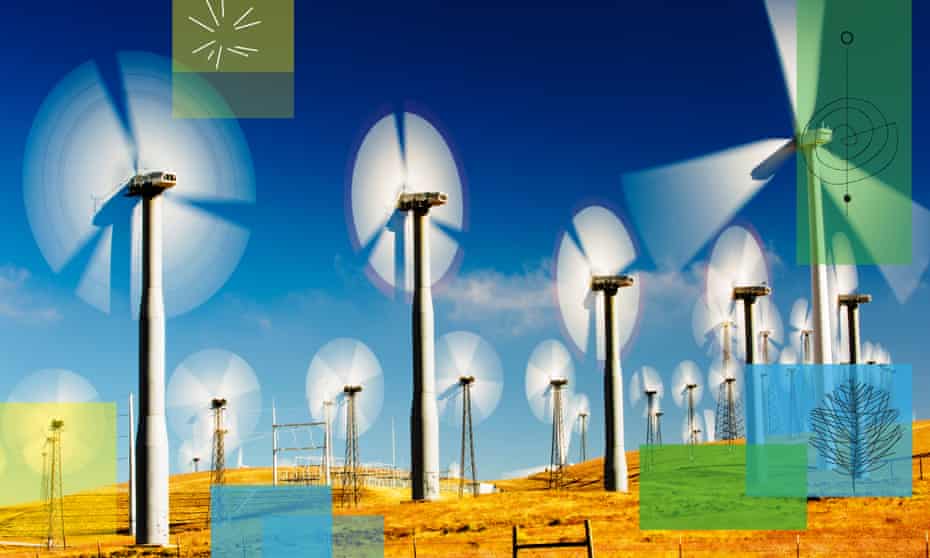Extract from The Guardian
Glasgow 2021 must be the moment when the promise of Paris 2015 becomes real – history will not forgive us otherwise.

Part of the Tehachapi Pass windfarm in California, one of the first large-scale windfarm areas developed in the US.
Last modified on Sat 30 Oct 2021 21.39 AEDT
Summits do not always live up to the name. They can get bogged down in detail and disagreement, never really reaching altitude.
That is often the case with the annual UN climate summits known simply as the Cop, which have earned a reputation since the first was held 26 years ago for being bewildering marathons that overrun and underdeliver.
This year, perhaps more than any other year, the world needs the summit that starts tomorrow in Scotland to hit the heights. We’ve had make-or-break moments before, of course, when the climate movement has teetered on the brink of collapse at a Cop only to be rescued by a deal (or fudge) in injury time.
But Glasgow 2021 feels even more do-or-die, because the climate emergency is more finely balanced than ever before between hope and despair, and the effects are already all around us.
One path, the path of short-sighted national self-interest, leads us deeper into the crisis that Guardian reporters are covering with ever greater frequency around the world: the heatwaves of Russia, eastern Europe and the west of North America this year; the floods in China, Germany, India, England, Greece, Thailand. The drought in eastern and southern Africa, threatening hunger, even famine, in places such as Madagascar. The wildfires in Australia, the United States, Canada, Europe, recurring with greater intensity, greater destruction.
Increasingly, at certain times and in certain places, the Earth is literally becoming unlivable. And this is a world warmer by just 1.2C over pre-industrial levels. A world two or even three degrees warmer in which our descendants will swelter in a few decades’ time if we carry on regardless is a terrifying prospect.
But the word “crisis” has a second, less well-known meaning, from the original Greek – a turning point, an opportunity. What is perhaps different about this Cop, this moment, is that the opportunity is greater than ever.
There has never been as much innovation, investment and interest in green technology. The revolution in renewables, which have soared from a niche interest 30 years ago to a cheap, global alternative energy source that provides more than one quarter of the world’s electricity, is one of humanity’s most remarkable achievements.
Heat pumps and hydrogen are becoming household words, if not quite yet household appliances. Batteries, zero-carbon ships and aeroplanes, meat-free food and electric vehicles and other emissions-cutting technologies are all still in their infancy, full of potential. Science, so vital in our dogfight with Covid, is once again playing its part.
Now we need the politicians to play their part too. The fate of billions rests in their hands. Business and consumers are showing willing – but people take their cue from the government, from policy, from binding commitments.
So the Cop26 climate summit, which starts in Glasgow tomorrow must be the moment when the hope generated by the Paris deal in 2015 becomes real.
The conference needs to find agreement on deep cuts to emissions. It needs to provide serious funding for developing nations to help them cope with the impacts of extreme weather which are already being felt. It needs to commit to ending the razing of forests.
And most importantly, it needs to set targets for short-term progress and agree on a road map for action for the next decade. Every minute decisions are delayed, greenhouse gas emissions continue to rise – and the task ahead becomes more difficult, and urgent.
Taken together, ambitious measures in these areas could keep alive the goal of limiting global heating to 1.5C. It will be hard. The UN climate convention operates by the consensus of all nations, and geopolitical shifts have fractured international cooperation in many areas in recent years.
But we all live under the same sky. We must hold on to the fact that if the necessary systemic changes take place – from energy to transport to food – we could build a cleaner, healthier world.
As Nicolas Stern, the British economist and author of the seminal 2006 government study into the costs of climate change, says, a just transition to a low-carbon economy is the only viable future for humanity.
The time for prevarication is over.
History will not forgive this generation for the inevitable legacy that will come from inaction.
No comments:
Post a Comment